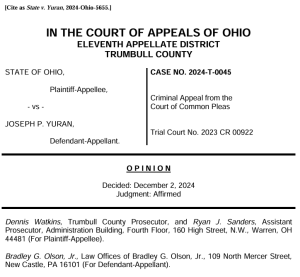 The headline from a recent article read, “Narcotics-based OVIs Rise in Ohio”. A police officer interviewed for the article said he has observed an increase in the number of drug-related OVIs. A representative of the Ohio State Highway Patrol reported fatal marijuana-related crashes rose 52% from 2019 to 2023. To combat this problem, Ohio law enforcement agencies are now using oral fluid testing to help determine intoxication from marijuana and other drugs.
The headline from a recent article read, “Narcotics-based OVIs Rise in Ohio”. A police officer interviewed for the article said he has observed an increase in the number of drug-related OVIs. A representative of the Ohio State Highway Patrol reported fatal marijuana-related crashes rose 52% from 2019 to 2023. To combat this problem, Ohio law enforcement agencies are now using oral fluid testing to help determine intoxication from marijuana and other drugs.
Continue Reading
Articles Tagged with Ohio DUI Lawyer
Expert Testimony and Jury Instructions in Ohio Vehicular Homicide Cases
 A recent appellate case involves two legal issues which are often litigated in Vehicular Homicide and Vehicular Assault cases in Ohio. The first issue is the admissibility of expert witness testimony. The second issue is whether the jury should be instructed about the option of finding the defendant guilty of a lesser offense. The case is State v. Horst.
A recent appellate case involves two legal issues which are often litigated in Vehicular Homicide and Vehicular Assault cases in Ohio. The first issue is the admissibility of expert witness testimony. The second issue is whether the jury should be instructed about the option of finding the defendant guilty of a lesser offense. The case is State v. Horst.
Repeat DUI/OVI Compared to First-Offense DUI/OVI in Ohio
 With St. Patrick’s Day around the corner, many people in Ohio will be celebrating at bars. Most of those people will drive home, and some of those people will be arrested for DUI (called ‘OVI’ in Ohio). How many of those arrests will involve drivers who have already been convicted of OVI at least once? How are repeat OVI offenses in Ohio treated differently than first offenses?
With St. Patrick’s Day around the corner, many people in Ohio will be celebrating at bars. Most of those people will drive home, and some of those people will be arrested for DUI (called ‘OVI’ in Ohio). How many of those arrests will involve drivers who have already been convicted of OVI at least once? How are repeat OVI offenses in Ohio treated differently than first offenses?
Former Trooper Appeals Sentence for Vehicular Homicide
 A former Pennsylvania state trooper was involved in a two-vehicle automobile crash, and the driver of the other vehicle died as a result. The former trooper, Joseph Yuran, was charged with Aggravated Vehicular Homicide as a second-degree felony and Operating a Vehicle under the Influence (OVI). Yuran pled guilty to those charges, and the judge imposed a prison term of 7 years to 10.5 years. Yuran appealed the sentence to the 11th District Court of Appeals, claiming the sentence was unlawful.
A former Pennsylvania state trooper was involved in a two-vehicle automobile crash, and the driver of the other vehicle died as a result. The former trooper, Joseph Yuran, was charged with Aggravated Vehicular Homicide as a second-degree felony and Operating a Vehicle under the Influence (OVI). Yuran pled guilty to those charges, and the judge imposed a prison term of 7 years to 10.5 years. Yuran appealed the sentence to the 11th District Court of Appeals, claiming the sentence was unlawful.
Ohio DUI/OVI Law Set to Change
 The law governing DUI (called ‘OVI’ in Ohio) is going to change. House Bill 37, signed by Governor Mike DeWine, becomes law on April 9, 2025. The legislation changes four separate areas of law: (1) Driving privileges and ignition interlock devices for OVI license suspensions; (2) Financial penalties for OVI convictions; (3) Oral fluid testing in OVI cases; and (4) Aggravated Vehicular Homicide penalties when a defendant has prior OVI convictions. This article addresses the changes in that order.
The law governing DUI (called ‘OVI’ in Ohio) is going to change. House Bill 37, signed by Governor Mike DeWine, becomes law on April 9, 2025. The legislation changes four separate areas of law: (1) Driving privileges and ignition interlock devices for OVI license suspensions; (2) Financial penalties for OVI convictions; (3) Oral fluid testing in OVI cases; and (4) Aggravated Vehicular Homicide penalties when a defendant has prior OVI convictions. This article addresses the changes in that order.
Seminar: Negotiations in DUI / OVI Cases
 Many continuing legal education seminars teach the art of trial skills. In the area of DUI (called ‘OVI’ in Ohio), fewer than five percent of cases go to trial, but 100% of cases involve negotiation. For the first time, the National College for DUI Defense (NCDD) held a seminar to improve negotiation skills. The presentations provided valuable insight, and three of them stood-out to me.
Many continuing legal education seminars teach the art of trial skills. In the area of DUI (called ‘OVI’ in Ohio), fewer than five percent of cases go to trial, but 100% of cases involve negotiation. For the first time, the National College for DUI Defense (NCDD) held a seminar to improve negotiation skills. The presentations provided valuable insight, and three of them stood-out to me.
Investigation: Hundreds of Sober Drivers Charged With DUI
 The city of Goodlettsville recently settled with a driver who was wrongfully charged with DUI (called ‘OVI’ in Ohio). The settlement was reported by a local television station which conducted an investigation into sober drivers charged with DUI. The investigation revealed the driver in Goodlettsville was one of hundreds charged with DUI and later exonerated by forensic testing.
The city of Goodlettsville recently settled with a driver who was wrongfully charged with DUI (called ‘OVI’ in Ohio). The settlement was reported by a local television station which conducted an investigation into sober drivers charged with DUI. The investigation revealed the driver in Goodlettsville was one of hundreds charged with DUI and later exonerated by forensic testing.
ADHD and DUI/OVI in OH
 Driving is an activity which requires sustained attention. Drivers must focus on driving and divide their attention among multiple parts of the driving activity: steering, acceleration, braking, watching the speedometer, watching the road, and reacting to a constantly changing environment. For DUI investigations (called ‘OVI’ in Ohio), law enforcement officers are taught to look for problems with attention and administer divided attention sobriety tests. What happens when the subject of an OVI investigation is a driver with ADHD?
Driving is an activity which requires sustained attention. Drivers must focus on driving and divide their attention among multiple parts of the driving activity: steering, acceleration, braking, watching the speedometer, watching the road, and reacting to a constantly changing environment. For DUI investigations (called ‘OVI’ in Ohio), law enforcement officers are taught to look for problems with attention and administer divided attention sobriety tests. What happens when the subject of an OVI investigation is a driver with ADHD?
Dunlap and Chatton: Compare Apples to Apples
 The Ohio Supreme Court recently decided a case in which an officer conducted a traffic stop after learning the basis for the stop was no longer valid. The issue was whether evidence obtained from the stop was admissible in the defendant’s trial. This issue was addressed by this court in 1984. However, in the recent case, the Court reached a different conclusion.
The Ohio Supreme Court recently decided a case in which an officer conducted a traffic stop after learning the basis for the stop was no longer valid. The issue was whether evidence obtained from the stop was admissible in the defendant’s trial. This issue was addressed by this court in 1984. However, in the recent case, the Court reached a different conclusion.
Child Endangering and DUI/OVI in Ohio
 This blog is not a bar band: we take requests without asking for tips! Yesterday, we received a question from a reader who wants to understand the interplay of Child Endangering and DUI (called ‘OVI’ in Ohio). This article is going to answer that reader’s question. Ask and you shall receive.
This blog is not a bar band: we take requests without asking for tips! Yesterday, we received a question from a reader who wants to understand the interplay of Child Endangering and DUI (called ‘OVI’ in Ohio). This article is going to answer that reader’s question. Ask and you shall receive.
 Columbus OVI/DUI Attorney Blog
Columbus OVI/DUI Attorney Blog

